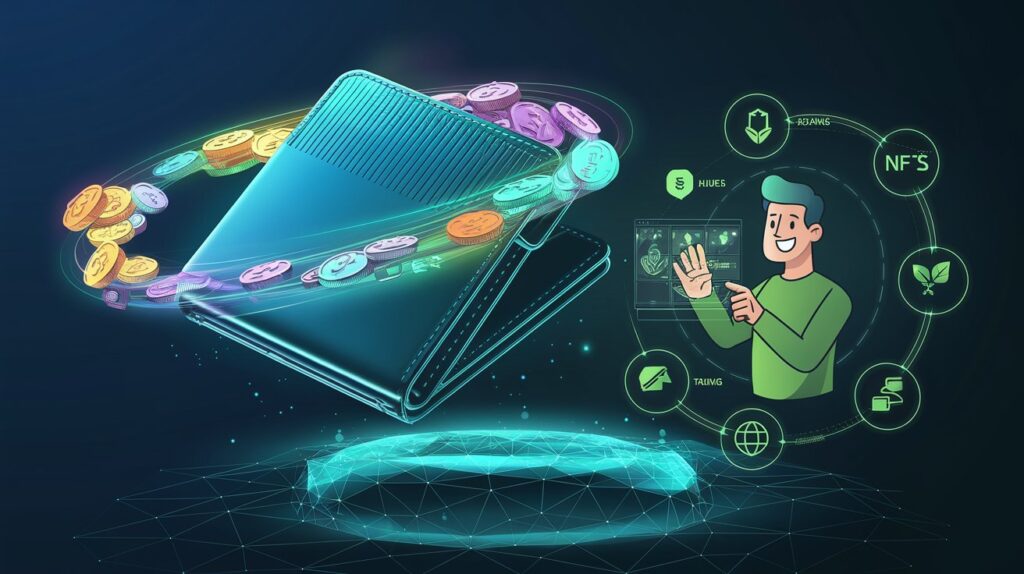Imagine holding the keys to your financial freedom—literally! That’s what a DeFi wallet offers. Curious about how it shakes up the money game? Wondering if it’s worth the hype? Let’s unpack this gem of decentralized finance (DeFi) together. This article dives headfirst into the nitty-gritty of DeFi wallets, answering your burning questions with a sprinkle of fun and clarity. Ready to explore? Buckle up!
What Exactly Is a DeFi Wallet?
A DeFi wallet isn’t your grandpa’s leather billfold. It’s a digital tool that lets you store, manage, and play with cryptocurrencies in the wild world of decentralized finance. Unlike traditional wallets at banks, nobody else holds your funds. You’re the boss! These wallets connect you to blockchain networks, letting you trade, lend, or stake your crypto without a middleman breathing down your neck.
Think of it like a superhero utility belt. It’s packed with powers—sending tokens, swapping assets, or even earning interest—all while keeping your money safe from prying hands. But here’s the kicker: with great power comes great responsibility. Lose your keys? Tough luck! No bank teller can save you. That’s the beauty and the beast of a DeFi wallet.
DeFi Wallet Biography Table
| Aspect | Details |
|---|---|
| Definition | A digital tool for managing crypto in decentralized finance, giving you full control. |
| Types | Hot (software—e.g., MetaMask), Cold (hardware—e.g., Ledger), Mobile, Browser-based. |
| Key Features | Stores private/public keys, connects to dApps, enables trading, staking, and NFT management. |
| Blockchains Supported | Varies—Ethereum, Solana, Binance Smart Chain, Polygon, and more, depending on the wallet. |
| Security | Non-custodial; safety depends on protecting your private key or seed phrase. |
| Popular Examples | MetaMask, Trust Wallet, Coinbase Wallet, Ledger, Trezor, Phantom. |
| Pros | Freedom, no intermediaries, eco-friendly potential, access to DeFi ecosystem. |
| Cons | Risk of losing keys, gas fees, learning curve, scam vulnerability. |
| First Appearance | Early 2010s, with Ethereum’s rise and DeFi’s growth (e.g., MetaMask launched in 2016). |
| Eco Impact | Lean operation; newer blockchains reduce energy use compared to traditional banking. |
How Does a DeFi Wallet Work?
So, how does this magical money pouch function? A DeFi wallet runs on blockchain tech—think of it as an unchangeable digital ledger. You get two keys: a public one (like your email address) and a private one (your super-secret password). The public key lets others send you crypto, while the private key unlocks your stash. Guard that private key like it’s pirate treasure!
When you want to do something extraordinary—like swap Ethereum for a shiny new token—you sign a transaction with your private key. The DeFi wallet chats with a blockchain, say Ethereum or Solana, and your action happens. No bank, no fees from suits in ties—just you and the code. It’s fast, it’s direct, and it’s oh-so-satisfying.
Why Should You Use a DeFi Wallet?
Why bother with a DeFi wallet when you’ve got PayPal or a bank app? Freedom, my friend! Traditional finance locks you into rules, fees, and wait times. A DeFi wallet cuts the cord. You control your cash, not some corporate overlord. Want to lend your crypto and earn interest? Done. Fancy trading on a decentralized exchange? Easy peasy.
Plus, it’s eco-friendly in spirit. No paper statements, no brick-and-mortar banks guzzling electricity—just lean, green blockchain vibes. Some blockchains chug energy, but newer ones like Solana keep things light. With a DeFi wallet, you’re part of a movement shaking up finance while keeping things sleek and sustainable.

Are All DeFi Wallets the Same?
Nope, not even close! DeFi wallets come in flavors like ice cream on a hot day. You’ve got hot wallets—software-based ones like MetaMask or Trust Wallet—that live on your phone or browser. They’re quick and handy for daily use. Then there are cold wallets, like Ledger or Trezor, which are hardware gadgets you plug in when needed. These are Fort Knox-level secure but less convenient for spur-of-the-moment trades.
Some DeFi wallets support tons of blockchains—Ethereum, Binance Smart Chain, you name it. Others stick to one, like Phantom for Solana. Picking the right one depends on your vibe. Are you a newbie dipping your toes? Or a crypto ninja juggling multiple chains? There’s a DeFi wallet for every adventurer out there.
What Can You Do with a DeFi Wallet?
Oh, the possibilities! A DeFi wallet opens doors to a playground of financial fun. You can trade tokens on decentralized exchanges like Uniswap—think eBay for crypto, minus the fees. Fancy earning some extra dough? Stake your coins or provide liquidity to pools and watch the rewards roll in.
Ever heard of yield farming? It’s like planting seeds and harvesting crypto profits. With a DeFi wallet, you dive headfirst into these DeFi apps (dApps). You can even collect NFTs—digital art or collectibles—from your wallet. It’s like having a Swiss Army knife for the blockchain world!
How Safe Is a DeFi Wallet?
Safety’s the big question, right? A DeFi wallet can be super secure—if you play it smart. Hackers can’t raid a central vault since it’s non-custodial (no third party holds your funds). But here’s the catch: your private key is the golden ticket. Please share it, lose it, or fall for a phishing scam, and your crypto’s gone faster than a kid’s Halloween candy.
Hardware DeFi wallets crank up the safety dial. They keep your keys offline, away from sneaky online threats. Software wallets, while convenient, need extra care—think strong passwords and two-factor authentication. Bottom line? A DeFi wallet is as safe as you make it. Stay sharp, and you’ll sleep easy.
Which DeFi Wallet Should You Pick?
Choosing a DeFi wallet feels like picking a new phone—exciting but tricky! MetaMask rules the roost for Ethereum fans with its slick browser extension and mobile app. Trust Wallet offers versatility, supporting millions of tokens across chains. Coinbase Wallet offers a newbie-friendly vibe with tight security.
For the paranoid (in a good way), Ledger or Trezor hardware wallets lock your crypto down tight. Solana lovers swear by Phantom for its speed and style. Ask yourself: Do you want ease or max security? Multi-chain support or a single-blockchain focus? Test a few—most are free to try—and find your perfect DeFi wallet match!

What’s the Catch with DeFi Wallets?
Nothing’s perfect. DeFi wallets have their quirks. For one, they’re not idiot-proof. Forget your private key or seed phrase, and you’re toast—no reset button here. Transactions cost gas fees—blockchain tolls that spike during busy times. Newbies might find the learning curve steep, too. What’s a dApp? How do you stake?
Then there’s the wild west vibe—DeFi’s unregulated, so scams lurk like sharks in shallow water. Fake apps, rug pulls, and shady links can drain your DeFi wallet if you’re not careful. It’s thrilling, but it’s not for the faint-hearted. Stay curious, double-check everything, and you’ll dodge the traps.
How Do You Set Up a DeFi Wallet?
Ready to jump in? Setting up a DeFi wallet is a breeze. Grab a software wallet like MetaMask—download it from the official site (beware fakes!). Install it, create a new wallet, and jot down your seed phrase—those 12 or 24 words are your lifeline. Store them somewhere safe, not your phone’s notes app!
Next, add some crypto. Buy Ethereum or another token from an exchange like Binance, then send it to your DeFi wallet’s public address. Boom—you’re live! Connect to a dApp, swap some tokens, and feel the rush. Hardware wallets take a bit more setup—plug it in, sync it up—but the process is just as straightforward.

Why Are DeFi Wallets the Future?
Picture this: a world where you don’t need banks, where finance is open to everyone with an internet connection. That’s the DeFi wallet promise. It’s not just a tool—it’s a revolution. More people ditch centralized systems daily, drawn to DeFi’s transparency and control.
Eco-friendly blockchains make it sustainable, too. As tech evolves, DeFi wallets get slicker—think better interfaces, tighter security, and broader access. They’re not flawless yet, but they’re rewriting the rules. Want in on the future? A DeFi wallet is your ticket.


